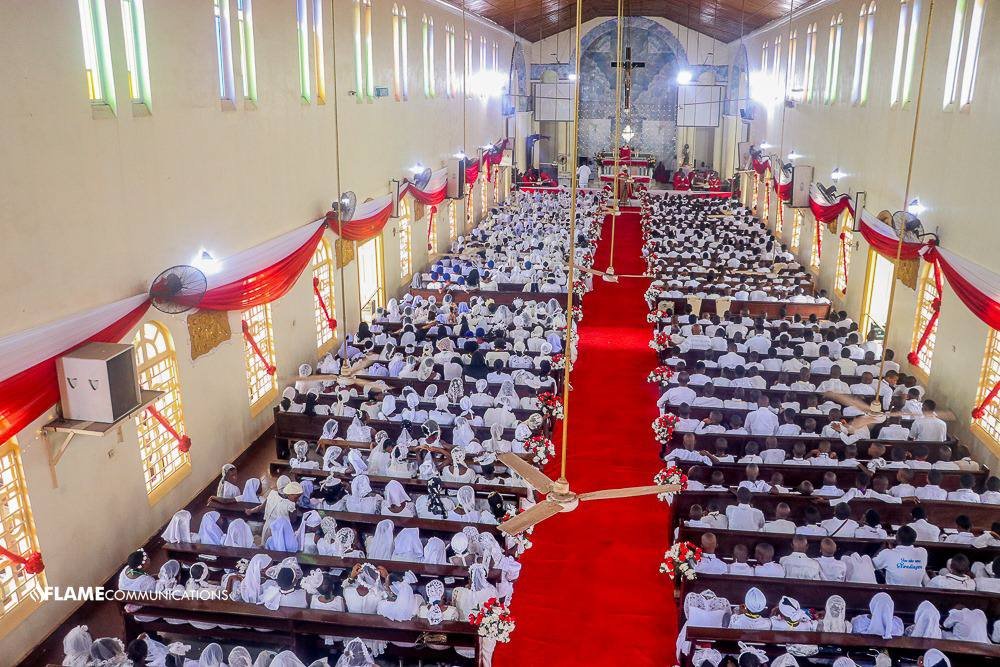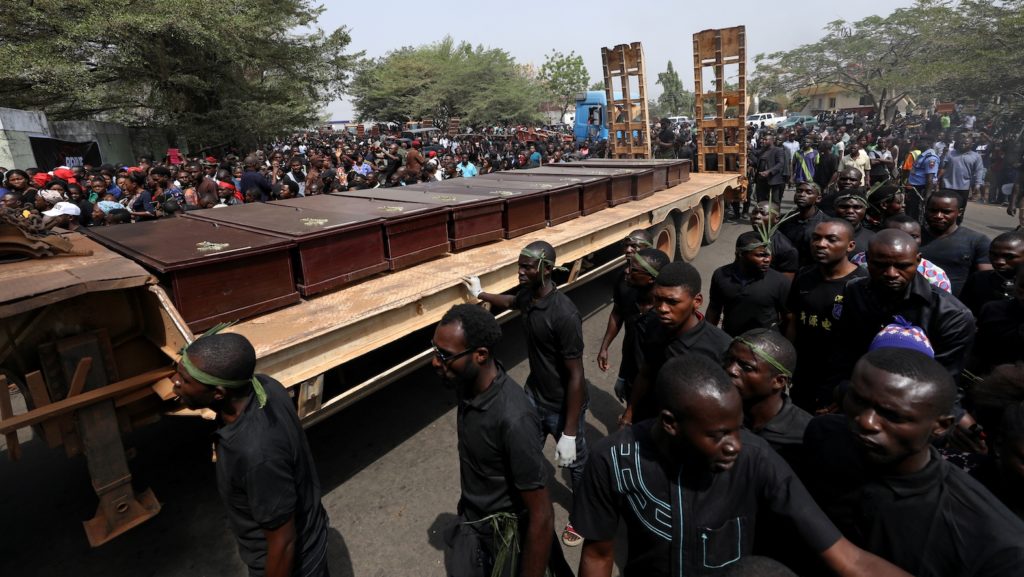After a scene of horror in which around 200 people were "brutally killed" in Yelwata, in Benue state, Nigeria, Pope Leo XIV prayed for the victims, calling it a "terrible massacre."
Despite extreme persecution, the Catholic Church grows in the country, with a record number of confirmations and Mass attendance.
Most of those killed in the recent tragic events were internally displaced persons "sheltered by the local Catholic mission," Vatican News reported.
Speaking just before delivering the Sunday Angelus prayer, the pope prayed for "security, justice, and peace" in Nigeria, adding that he was thinking in particular of the "rural Christian communities of the Benue State who have been relentless victims of violence."
Responding to the attack on June 14, Amnesty International Nigeria called on the country's authorities to "immediately end the almost daily bloodshed in Benue State and bring the actual perpetrators to justice."
The advocacy group Save the Persecuted Christians said that overnight between June 13 and 14, "Muslim Fulani militants raided a predominantly Catholic Christian town" outside of the town of Makurdi, "killing hundreds, say early reports from contacts within the Catholic Diocese of Makurdi."
The group said that "infants, toddlers and the elderly are among the butchered and burnt bodies. Fleeing victims were shot and hacked with machetes and thrown back into the fire."
Save the Persecuted Christians suggested the attacks were retaliation for Bishop Wilfred Anagbe of Makurdi's testimony before the U.S. Congress and at the U.K. Parliament this spring.
In the British Parliament in March, Bishop Anagbe talked about how his flock have seen their homes torched and been forced to flee to camps set up for people who are internally displaced, according to the pontifical charity Aid to the Church in Need.
The bishop said that Benue state, which includes Makurdi and nearby Yelwata, has been attacked by Islamist extremists and Fulani herders targeting Christian communities and has seen farmers driven from their land, churches burned, and priests, religious and lay members killed.
"The militant Fulani herdsmen bear on defenseless villagers without consequence," Bishop Anagbe said.
"They follow orders to conquer, kill, and occupy. They attack even those who have managed to escape into our IDP camps."
He added that for his people, their experience today "can be summed up as that of a Church under Islamist extermination."
Save the Persecuted Christians added in their June 14 X post: "This is Genocide."
At the beginning of June, at least 85 people were killed in coordinated waves of attacks in a span of a week in Benue state. The attacks began on June 1, when armed Fulani ethnic militia attacked Gwer West and Apa counties killing at least 43 people. Similar attacks earlier in Gwer County left another 42 people dead and thousands displaced.
Benue Concern Youths, a local advocacy organization, expressed the people's frustration in a letter to the state governor.
"Innocent lives have been lost once more," Unaji Pax Romana, the group's spokesman said in the letter. "We look to you for leadership and hope."
The Nigerian bishops' conference condemned earlier in June what it called a "barbaric massacre" of innocent citizens in Benue state.
"These cold-blooded attacks on defenseless communities where countless have been slaughtered, homes destroyed and families left in anguish -- are an affront to God, a stain on our shared humanity and a terrifying reminder of the utter breakdown of security in our land," said Archbishop Lucius Iwejuru Ugorji of Owerri, and the president of the bishops conference.
Despite growing and horrific persecution, Nigerian Catholics hold tight to their faith. The confirmation of nearly 1,000 Catholics in Nigeria has underscored the growth of the church in the West African country.

Auxiliary Bishop Ernest Obodo of Enugu Diocese, in the southeastern part of the country, conferred the sacrament of confirmation on 983 people at the Holy Ghost Cathedral on June 4.
The ceremony included both minors and adults, but youth made up the majority.
"The bishop feels joyous and thankful because the Gospel is taking flesh in this part of the world. It is a positive development and he feels happy seeing the rewards of evangelization blossom in such numbers," Father Anthony Aneke, diocesan director of communications, told OSV News.
"It portrays the growth of the Catholic faith in Nigeria, despite widespread religious persecution and obstacles. The church in Nigeria is experiencing growth and increase despite the problems bedeviling her."
Numerous confirmations are being viewed as bright light in the midst of dark clouds.
Father Aneke attributed the huge number of confirmations to several factors, including the increased longing of people for the sacraments, positive evangelization initiatives by both pastors and lay ministers, and proper catechesis and deepening of faith.
In the June 4 ceremony, held as part of the diocese's feast of Pentecost and attended by the clergy, parishioners and families, each parish and institution had sent two candidates.
Bishop Obodo, presiding over the ceremony said that "Like wind and fire, the Spirit purifies, sanctifies and strengthens us," he said as quoted on ChoiceFlame website.
Nigeria, Africa's most populous country, is experiencing deadly violence in several parts of the country -- from internationally recognized terror groups such Boko Haram, from mainly Islamic Fulani herders, bandits or gangs.
The groups have encroached on farmlands, threatening farm owners and forcing out Christians. Analysts have described this as slow, but silent persecution, which until now, authorities have not classified as terrorism.
The Nigerian church is also experiencing numerous kidnappings of priests.
Father Alphonsus Afina, assigned to several parishes across Alaska from September 2017 through 2024, was abducted June 1 in Nigeria, his home country, along with an unspecified number of fellow travelers while in Nigeria’s Borno state, near the northeastern town of Gwoza. Faithful on two continents are praying for his safe return.
In December, Nigeria's National Bureau of Statistics released a report showing more than 2 million had been abducted between May 2023 and April 2024 alone, with 600,000 Nigerians killed and Nigerians paying some $1.42 billion in ransom -- an average of $1,700 per incident -- during that period.
Despite ongoing persecution, 94% of self-identified Nigerian Catholics surveyed said they attend weekly or daily Mass, according to a study published in early 2023 by Georgetown University's Center for Applied Research in the Apostolate.

